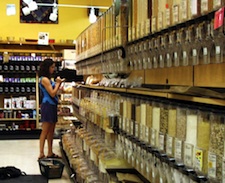Chances are, you are aware that this summer has been hot.
It’s been much hotter than normal where I live, in the intermountain west.
The result of all this hot weather is likely to be failing crops.
Indeed, I notice that, thanks to a strange winter, and hot weather, our garden isn’t doing as well as it did last year. We don’t have the same number of tomatoes and peppers. Even our berries are failing. (Our herbs, on the other hand, are thriving. Apparently, the basil, oregano, and thyme are all fond of this weather.)
Across the nation’s farmland, a similar situation is playing out on a larger scale.
Drought is causing crops of corn and soybeans to begin failing, and that will likely mean a squeeze in supply — and a rise in food prices. But it’s not just a direct rise in prices, such as a rise in corn prices. This type of issue is likely to spread throughout the food supply chain.
What we often forget is that we aren’t the only living things that need grown food.
Consider corn and other grains: The meat that we eat have to eat — and that meat (whether it’s cows or chickens or pigs) often eats grains. The result is that meat prices are likely to rise in the next few months. In fact, the USDA and the Bureaus of Labor Statistics, predict that the price of ground beef could rise 4% this year from last year’s price. That means that ground beef might rise to $2.88 per pound; last year, the average price per pound was $2.77. Steak is likely to get more expensive as well, with an increase of 25 cents per pound this year over last year. Chicken prices are on the rise as well.
What Can You Do about Food Prices Inflation?
Of course, the cost of food regularly goes up.
However, the jumps aren’t always this big. The drought is wilting plants, and that is resulting in higher prices as the harvest looks sparser than in recent years.
So, what can you do to protect yourself from food prices inflation?
Well, it’s not always as straightforward as other inflation hedges, but it’s still possible.
Here are a few things you can do to help you reduce some of the effects of food prices inflation on your pocketbook:
Reconsider your diet

If you eat a lot of meat — especially beef — you might get hit harder by food prices inflation.
You can reduce some of your exposure by adjusting your diet.
Consider replacing some of your meat entrees with vegetarian entrees. You don’t have to go meat-free, but changing your diet a little bit can save you money.
Buy in bulk, and on sale
When you can buy bulk items on sale, you can save money, and stock up. Then, when prices rises, you don’t need to spend as much food each week.
Check the unit price
Don’t just rely on the size of the package. Check the per unit price, such as how much something costs per ounce. You want the best per unit deal. Be careful when shopping so that you save as much as possible on food.
Prepare foods on your own
It’s tempting to go the convenience route, but that costs more.
Cubed meat, shredded cheese, and pre-made snack bags cost more. You can save money by cutting up your own produce, preparing your own snack bags, and shredding your own cheese. Then, the fact that food prices are rising won’t matter as much to you.
Build home food storage
Not only can home food storage help you prepare for emergencies, but it can also help you beat food prices inflation.
Buy at lower prices, and avoid some of the impacts of higher prices. Just make sure you rotate foods so that you don’t end up wasting it.
Grow your own food
One of the best ways to beat food prices inflation is to grow your own food.
A garden can save you money, especially if you preserve your food for later. I have homemade applesauce from the fruit off our apple tree. I use fresh herbs during the summer, and dry the extra for winter. And we save a ton because raspberries, blackberries, and strawberries are so expensive. Even though our harvest is down this year, we still have enough that we don’t need to buy them from the store.
To Sum
While there is no way to completely avoid rises in food prices, you can reduce the impact that these rises have on your family budget.
A little careful planning can go a long way.
I normally follow some of these tips and they do save money. If something becomes astronomically expensive I will cut it out (like Bacon a couple years back) but overall it normally doesn’t affect my budget too much as I have flexibility built in.
Buy local and eat in season.
The cutting up your own produce tip is a good one. I noticed that my wife was doing this when we got married, and it just makes sense that it would save us money. Great article!